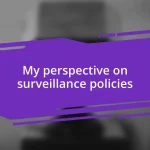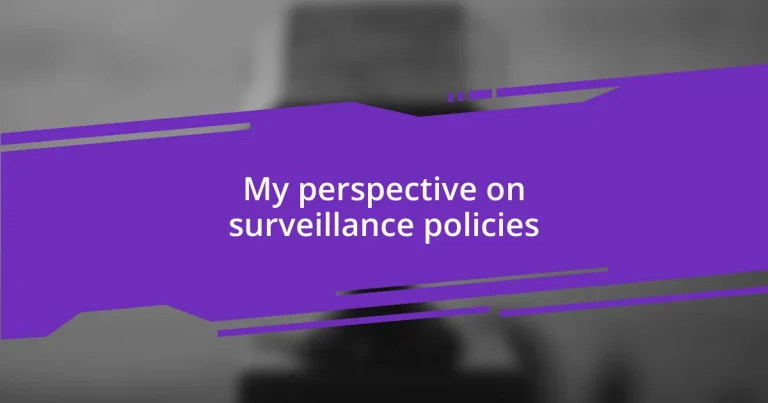Key takeaways:
- Surveillance policies reflect a tension between security and privacy, highlighting societal debates on the balance between safety measures and individual rights.
- The evolution of surveillance laws has been influenced by technological advancements, historical events like 9/11, and changing public perceptions, raising concerns about the trade-off between freedom and security.
- Future surveillance policies are likely to focus on digital rights, community engagement, and the ethical implications of technologies like AI, emphasizing the need for active participation in shaping these policies.
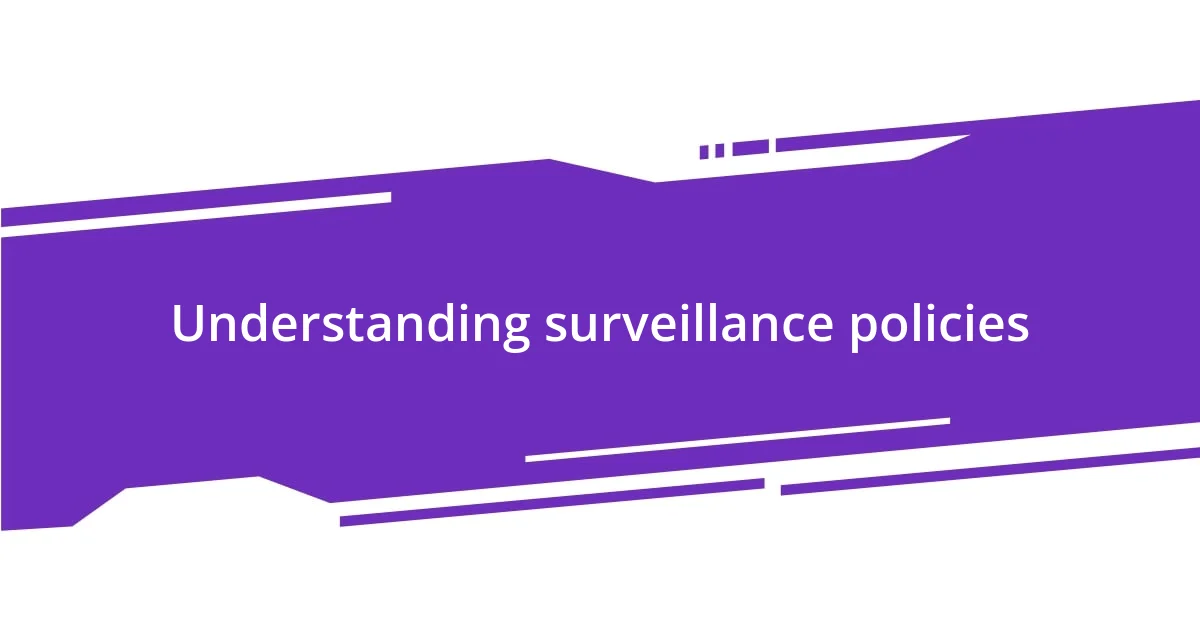
Understanding surveillance policies
Surveillance policies refer to the rules and regulations that govern how monitoring is conducted, often by governments or organizations. It’s fascinating to consider how these policies can vary dramatically from one country to another. I still remember my trip to a foreign city where I felt uneasy seeing cameras on every corner, questioning, “What are they watching, and for whose benefit?”
When I think about surveillance policies, I can’t help but reflect on the balance between security and privacy. A few years ago, during a community meeting, I witnessed a spirited debate about a proposed neighborhood watch program. People expressed genuine concern about being watched all the time, yet some argued it would enhance safety. Isn’t it intriguing how our need for security can sometimes overshadow our right to privacy?
The emotional complexity of surveillance policies cannot be overstated. I often ponder what it means to live under constant observation. In an age where our every online move can be tracked, sometimes I ask myself, “Am I really free?” This tension between feeling protected and feeling monitored is a key element in understanding these policies and their profound implications on our daily lives.
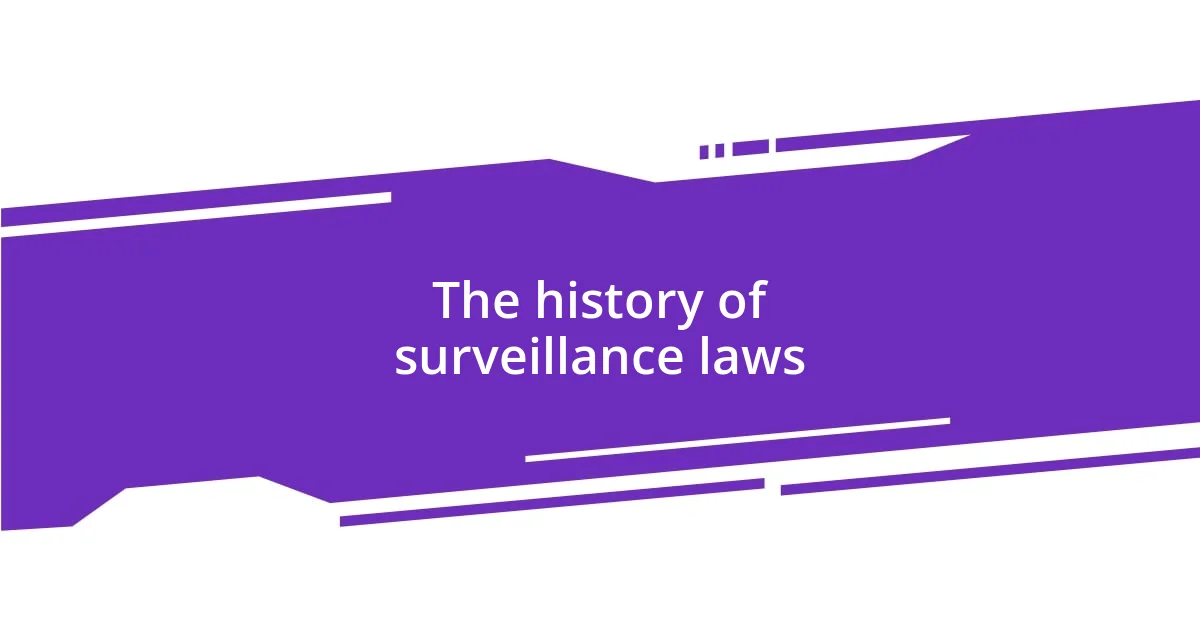
The history of surveillance laws
The evolution of surveillance laws is a captivating journey shaped by technological advancements and societal shifts. I think back to when I first learned about the Wiretap Act of 1968 in a history class, which marked a significant milestone in regulating eavesdropping in the United States. It illustrated a growing recognition of privacy concerns during a tumultuous era, as legitimate fears about government overreach were rising.
- In the early 20th century, surveillance was often used for crime prevention, but legal frameworks were primarily vague.
- The 1960s and 1970s saw the introduction of various laws, including the Freedom of Information Act and the Foreign Intelligence Surveillance Act.
- The rise of the internet in the late 1990s sparked new debates about digital privacy, leading to laws like the Electronic Communications Privacy Act.
- Following events like 9/11, mass surveillance policies expanded significantly, influenced by national security anxieties.
- Today, ongoing developments in technology, such as artificial intelligence, continuously challenge and reshape existing laws.
As I reflect on these developments, I can’t help but feel a mix of nostalgia and apprehension about how the laws have shifted in response to societal fears. Each new law or amendment often feels like a reaction to a pressing crisis, which leaves me questioning—are we safeguarding our freedoms, or simply trading them for a fleeting sense of security?
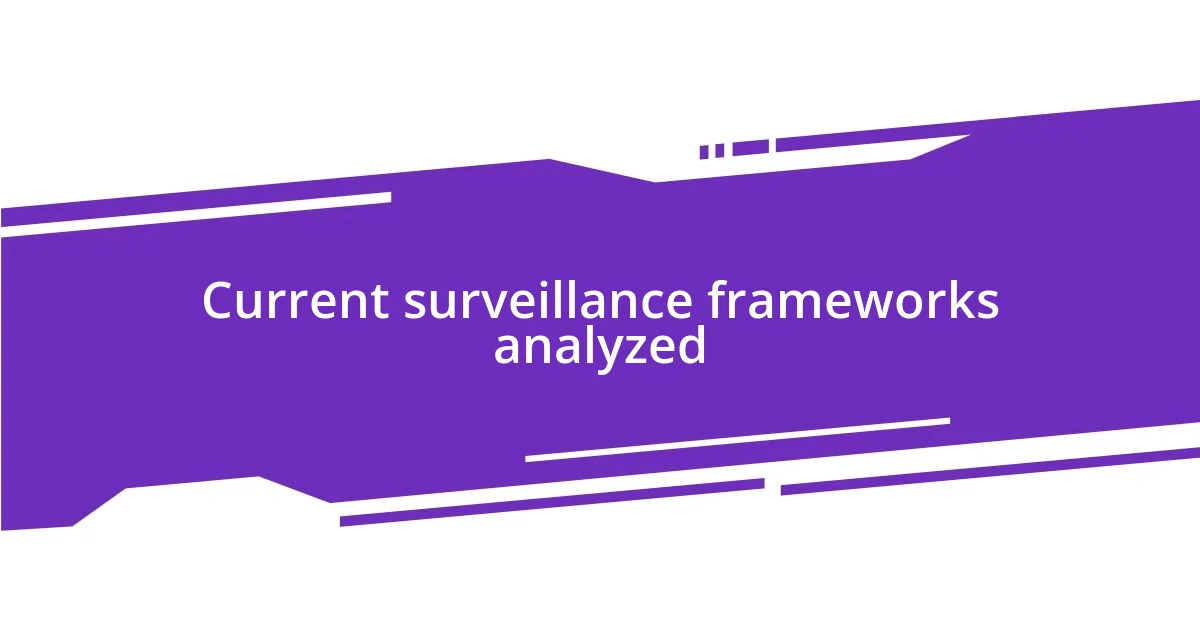
Current surveillance frameworks analyzed
The current surveillance frameworks reveal a complex landscape influenced by technology, public opinion, and legal precedent. I recall an experience attending a town hall meeting where heated discussions erupted over the implementation of facial recognition technology. People were polarized—some argued it would enhance public safety, while others, like myself, felt an unsettling sense of being reduced to mere data points. This tension encapsulates broader concerns about the accountability of such systems; who truly oversees how this information is used?
I’ve seen how different frameworks can lead to varying outcomes based on cultural perspectives. For example, in countries like China, expansive surveillance is integrated into daily life, often justified under the guise of social stability. Meanwhile, nations with stricter privacy laws grapple with balancing security measures and individual rights. This got me wondering, are we sacrificing our autonomy for convenience? The comparisons undeniably reveal the ethical dilemmas embedded within surveillance policies.
Examining current frameworks also raises critical questions about their future. As I ponder advancements in technology, like artificial intelligence, I can’t help but feel both excitement and dread. While these technologies can enhance security, they also carry the risk of overreach. I remember watching a documentary on the consequences of intrusive data collection that left me questioning the boundaries of acceptable surveillance. It underscores the essential need for continuous public discourse as our world evolves.
| Country | Surveillance Framework |
|---|---|
| United States | Primarily governed by various laws including the USA PATRIOT Act, emphasizes national security while ensuring some degree of citizen privacy rights. |
| China | Massive state surveillance program; extensive use of facial recognition and social credit systems, prioritizing social control over individual privacy. |
| Germany | Strong data protection laws rooted in privacy rights stemming from historical contexts, focusing on limiting government surveillance. |
| United Kingdom | Utilizes CCTV extensively along with legislation like the Investigatory Powers Act that allows surveillance but raises privacy concerns. |
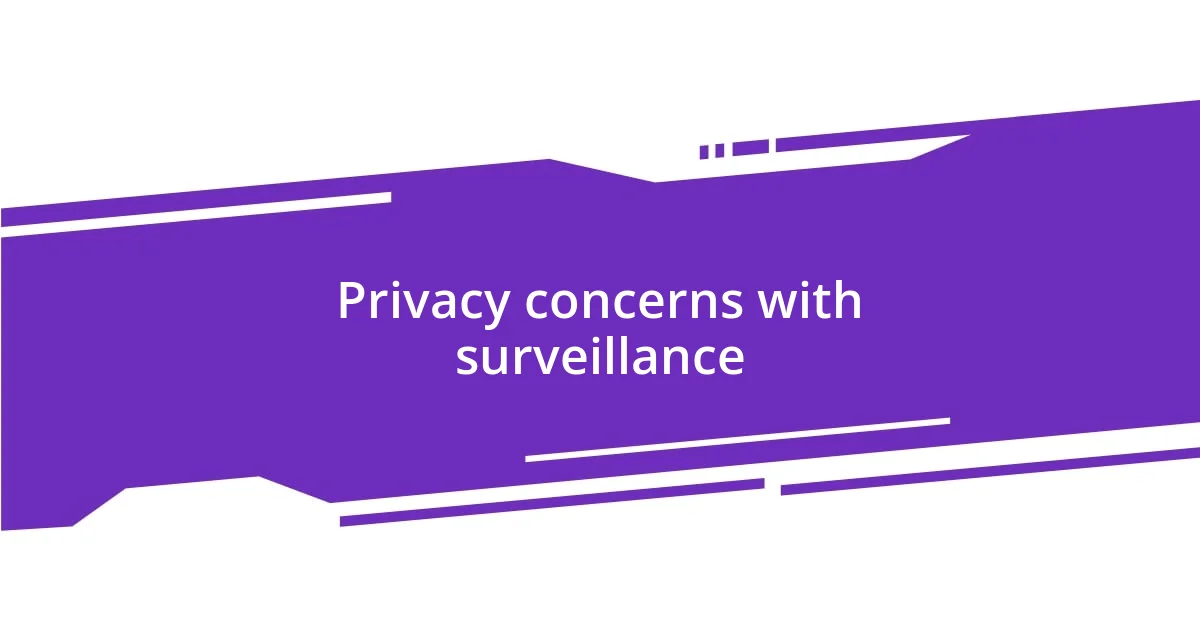
Privacy concerns with surveillance
The surge in surveillance has made many of us uneasy, and understandably so. Just the other day, while walking through a busy city street, I noticed countless cameras watching over us. It hit me then—are we really safer, or are we just becoming accustomed to being monitored? This constant oversight can feel intrusive, as if our lives are on display, leaving little room for genuine privacy.
I vividly recall a friend sharing a story about her experience with an app that tracks her location. At first, she appreciated the convenience it brought. Yet, as the weeks went by, she began to feel anxious about this digital footprint. It dawned on her that every location, every move, was logged and analyzed. I wondered then—how many of us truly reflect on the implications of our everyday technology? The discomfort of knowing that our data is constantly collected can lead to a sense of vulnerability.
Moreover, I think about the subtle yet pervasive impact of surveillance on personal relationships. Have you ever felt hesitant to share an opinion due to fear of surveillance? In my own life, I’ve noticed reluctance among friends to discuss sensitive issues, fearing someone might be listening. This atmosphere of distrust not only erodes our sense of community but also stifles open dialogue, leaving me questioning the balance we strike between safety and our fundamental right to privacy.
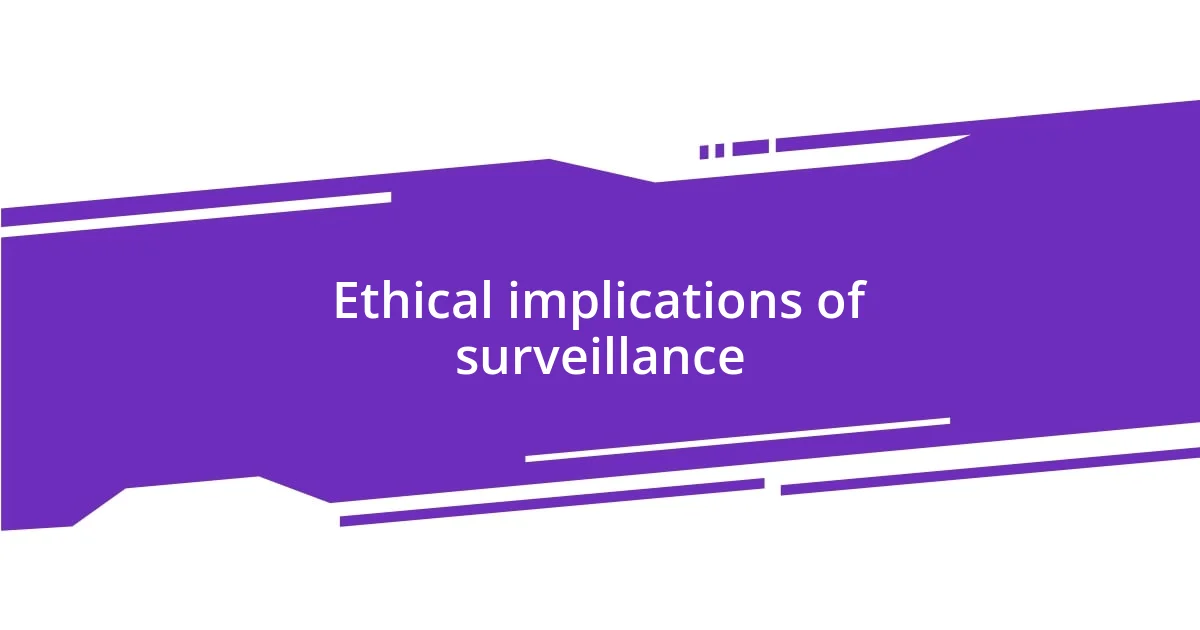
Ethical implications of surveillance
Surveillance raises significant ethical concerns that cannot be overlooked. I often think about the implications of constant monitoring on individual autonomy. One time, while having dinner with friends, the conversation shifted to how being observed changes our behavior. I admitted that sometimes I feel like I’m performing rather than just living my life. This realization highlights a fundamental ethical dilemma: are we losing our authentic selves in the pursuit of safety?
The effectiveness and necessity of surveillance must also be weighed against potential misuse. I recall a news story about a community that installed surveillance cameras to deter crime, only to have those recordings misused by local authorities for purposes beyond public safety. It genuinely made me question, who safeguards our rights when surveillance tools can be wielded without accountability? Every instance of misuse erodes trust and raises the stakes in discussions about ethical surveillance practices.
Additionally, I can’t help but reflect on the difference in values between societies that embrace surveillance and those that resist it. Consider how a friend of mine living in a surveillance-heavy country expressed her frustration at the ever-watchful eye of the state. She described feeling powerless, as decisions made in her life were often second-guessed due to fear of being monitored. This made me wonder, can a society truly thrive when its members feel constantly scrutinized? The ethical implications of surveillance indeed stretch far beyond mere technology; they tap into the very essence of our freedom and humanity.
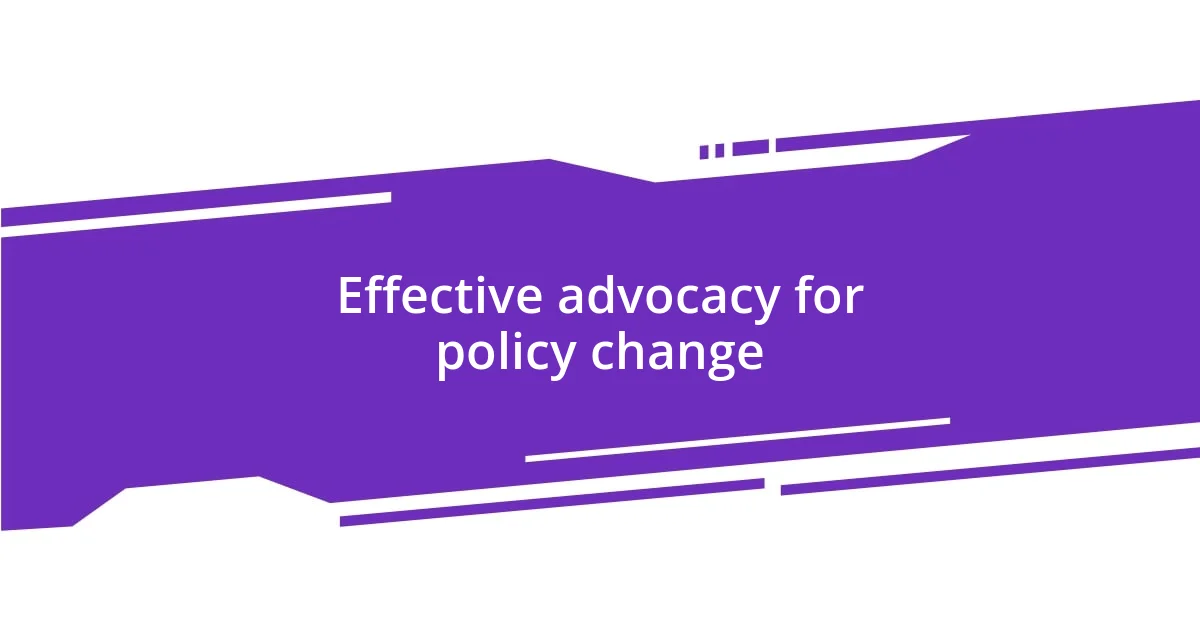
Effective advocacy for policy change
When I think about advocating for policy change, I realize it requires a blend of passion and strategy. A few months ago, I joined a local group that focused on advocating for privacy rights. Together, we brainstormed engaging ways to reach out to policymakers. I found that personal stories resonate more than statistics—sharing how surveillance impacted our lives made the issue tangible and urgent, sparking discussions that lingered long after our meetings.
In my experience, building coalitions with like-minded organizations can amplify our voices. At one rally, I met someone from a technology advocacy group, and we began to share insights on the intersection of privacy rights and technology. This collaboration opened my eyes to new perspectives and allowed us to combine our efforts for a greater impact. It makes me wonder, how much strength do we truly find in unity, and how can we leverage diverse voices to drive effective advocacy?
Ultimately, I believe that effective communication is at the heart of successful advocacy. I recall writing an open letter to my local newspaper, expressing my concerns about surveillance practices in our community. The feedback was overwhelmingly positive and brought people together in shared outrage. It made me think—when we articulate our fears and aspirations clearly, we invite others to join the conversation. Isn’t that what advocacy is all about? Engaging people in a dialogue that not only informs but inspires change.
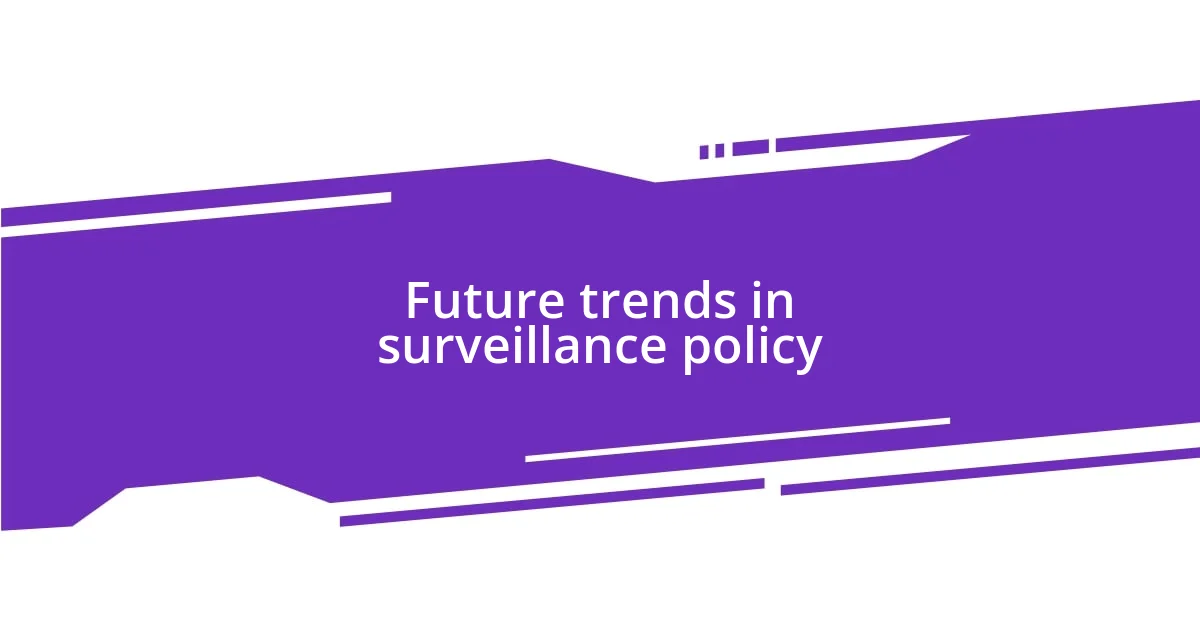
Future trends in surveillance policy
There’s no doubt that technology will continue to shape future surveillance policies. I recently participated in a discussion where someone introduced the idea of artificial intelligence (AI) in monitoring. It struck me how advancements could lead to more sophisticated data analysis but also raised concern: who decides what’s deemed important enough to surveil? This certainly makes me wonder—will enhanced AI capabilities bring about greater transparency, or will they deepen existing privacy violations?
Looking ahead, I believe a growing focus on digital rights will emerge in the wake of public concern. I recall an instance where I attended a conference on data privacy, and one speaker passionately described the potential for citizens to reclaim their digital identities. It was inspiring to envision a future where individuals feel empowered to advocate for their rights in the digital landscape. How do we enable this shift from passive observation to active participation in policy-making?
Finally, I think we’ll see a greater emphasis on public engagement in surveillance policy discussions. I remember when my local council held an open forum on surveillance practices, and the outpouring of community opinions was remarkable. It highlighted how valuable grassroots participation can inform and shape policies. This leads me to ponder—do decision-makers truly grasp the impact of surveillance on our daily lives, or is there a disconnect that we need to bridge through ongoing dialogue?










